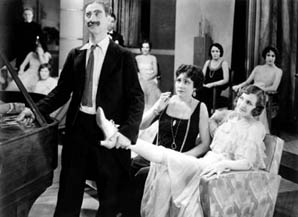Classic Movie Review: Animal Crackers
By Josh Spiegel
January 24, 2011
BoxOfficeProphets.com

Animal Crackers, their 1930 classic, does the best job possible of any such Marx comedy to make the romantic subplot actually important. That none of the four Marx brothers ever got lucky within any of these movies isn’t exactly disappointing (there’s a running gag throughout this one, in particular, where Harpo chases around a buxom blonde). The real issue is that there’s plenty of subversive and crazy hijinks going on throughout Animal Crackers and everything grinds to a halt when we cut away from the main action and focus on two young lovers who pretty much just happen to be in the same house as Groucho and his gang. Groucho couldn’t really get involved in a romantic storyline, and that’s because who’d buy him as a wooing paramour? His constant jibes at Dumont (as Mrs. Rittenhouse) cheerfully skewer and mock conventions of the genre, instead of enforce them.
As with most of the Marx comedies, the plot is barely a thread: Groucho plays famed explorer Captain Spaulding, returning to New York to tell wild stories about his exploits to members of high society. When a valuable painting is stolen while he’s there, he helps investigate the theft. Like a few other of their films, Animal Crackers has a few songs, but that’s because this film is based on a Broadway show of theirs. Classic songs such as “Hello, I Must Be Going” and “Hooray for Captain Spaulding,” which would both help define Groucho’s career on television, appear here, as do many classic quotes of Groucho’s, including this gem: “One morning, I shot an elephant in my pajamas. How he got in my pajamas, I don’t know.” Animal Crackers is not the best of the Marx films, but it’s one of the sharpest and wittiest.
It’s not just the intrusion of romance that keeps Animal Crackers from not being the best (for me, the very best Marx film remains Duck Soup, as insane and hilarious as ever more than 70 years after its release). In some ways, what makes Animal Crackers close to the best, but nothing as close as Duck Soup, is that it’s content just giving us what we expect from a comedy like this. Groucho will be plenty funny, with lots of great one-liners. Chico will sound-a like he’s-a an Italian. Harpo will mug for the camera and laugh. There’s nothing wrong with this formula, but a movie like Duck Soup packs in all of these jokes (along with some great silent humor, including the iconic gag with two Grouchos and a mirror) and makes sly comments about politics that are as resonant today as they were in 1933.
Animal Crackers gets in some good jokes, but they’re mostly jokes of the time. What Duck Soup is able to do is speak to the skepticism regular people have always had of those who have all the power. Animal Crackers, despite having something of a mystery driving the story, is just one in a long line of movies that are meant to make people feel good about the world for 90 minutes as opposed to thinking about the Great Depression. Those films served a major purpose in the 1930s, but now, there’s only so many high-society comedies that work well. While Animal Crackers has the Marxes skewering dowagers and rich folk like Margaret Dumont, it doesn’t feel like a bracing bit of fresh air so much as par for the course. The Marx brothers would always make fun of rich people in their work, so the jokes don’t ring as well.
Of course, the real problem with the Marx brothers, if there was ever a major one, is that Margaret Dumont managed to feel more like a fourth member of the family than Zeppo ever did. What was Zeppo’s function in the films? He played the social secretary, the buttoned-down guy. But where’s the humor in that? Even in Duck Soup, where he’s less intrusive than usual, I have to wonder what he is doing in the movie aside from riding on his brothers’ coattails. I don’t know enough of the history of the four brothers’ work in vaudeville and on Broadway to know what his special skill was or wasn’t (Harpo, obviously, was a skilled harp player, and Chico was pretty solid on the piano), but the movies almost actively push Zeppo to the sidelines. Perhaps the most notable fact about Zeppo is that he was skilled enough as an impressionist to play Captain Spaulding many times on Broadway, filling in for Groucho. Who knew he had it in him?
Animal Crackers doesn’t break new ground for the Marx brothers, but it’s a reminder of how funny they were, and how infrequently their fast, verbal humor makes an appearance in modern comedy. These days, we’re lucky if a great comedy doesn’t also involve gross-out humor or other R-rated sight gags. The Marxes, from Groucho’s biting wordplay to Harpo’s bulging, comic eyes, were pioneers of the day, even if they weren’t always perfect. Their filmography is hit-and-miss, but Animal Crackers stands out as one of their best, mystery and romance aside. Groucho, Chico, and Harpo live on today, in spirit, while Zeppo remains something of a has-been. He can say he was there, but unlike the others, all he can say he did is about as much as any of us would have done had we been in his place: stand, watch, and try not to laugh on screen.